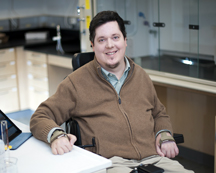Resource to help students with disabilities who love science
June 10, 2014
 |
|
Brad Duerstock, a Purdue associate professor of engineering practice and director of the Institute for Accessible Science, is focusing on greater inclusion of college students with disabilities in science, technology, engineering and mathematic fields. He led the project and is co-editor of the new booklet resource "From College To Careers: Fostering Inclusion of Persons with Disabilities in STEM." (Purdue University photo) |
WEST LAFAYETTE, Ind. — Adaptive tools, laboratory redesigns and research internship program suggestions for students with disabilities are just some of the resources available in a new booklet to encourage greater inclusion of college students with disabilities in science, technology, engineering and mathematic fields.
"From College To Careers: Fostering Inclusion of Persons with Disabilities in STEM" is based on a three-year project led by Brad Duerstock, a Purdue University associate professor of engineering practice and director of the Institute for Accessible Science, and Susan Mendrysa, an associate professor of biomedical sciences in the College of Veterinary Medicine.
The institute was funded by a $2 million grant from the National Institutes of Health Director's Pathfinder Award. This online and print resource is co-edited by Clark A. Shingledecker, research professor of computer science and engineering at Wright State University.
"The transition to higher education is when STEM starts to lose students with disabilities," Duerstock said. "And that is why it is important to share what kinds of interventions could help retain students and ultimately help increase the nation's number of persons with disabilities employed in the life science and engineering fields. The examples featured demonstrate creativity and motivation in adapting lab technologies and STEM learning spaces to accommodate these students. Yes, some can be expensive, but many are affordable and manageable, such as adding Braille labels to lab equipment and tweaking computer software to speak measurements rather than just display numbers."
Other examples of accessibility issues covered in the booklet include different strategies for designing assistive technologies for students with disabilities, specific challenges facing veterans with disabilities and comparing the benefits and disadvantages of hands-on learning experiences to the use of 3-D computer simulations such as virtual microscopy.
Duerstock specializes in developing adaptive technologies such as AccessScope, which is a remote-controlled research light microscope for people with limited use of their arms and low vision, and also is working on developing new interfaces, such as haptic technology, to allow blind students to better perceive visual scientific data. Duerstock's academic appointments are in the Weldon School of Biomedical Engineering and School of Industrial Engineering.
Twenty-five researchers and experts in this field contributed to this booklet as well as feedback provided by invited researchers, college educators, policymakers and program officers from across the country during a two-day workshop in May 2013 at Purdue. In addition to assistive technologies, the book's other themes discuss mentoring and internships, and other interventional programs, what motivates students with disabilities, educators, and other stakeholders to promote STEM participation and what are strategies to support and grow effective programs for long-term success.
The book also includes specific examples of programs taking place at Purdue including its 2013 IAS Summer Undergraduate Research Fellowship program and the annual Able Flight program that helps people with disabilities learn to fly.
"Some disabilities are obvious physical disabilities and others are invisible, but either way, individual challenges can be overcome," Duerstock said.
In addition to being funded by the Institute for Accessible Science at Purdue, the book also was partially supported by Wright State University through its National Science Foundation Integrative Graduate Education and Research Traineeship (IGERT) program. The book is produced by the Science/AAAS Custom Publishing Office.
Writer: Amy Patterson Neubert, 765-494-9723, apatterson@purdue.edu
Source: Brad Duerstock, bsd@purdue.edu
